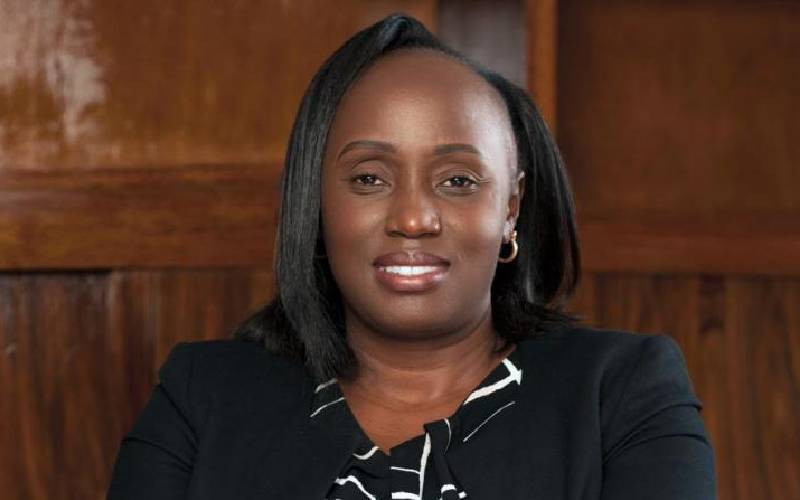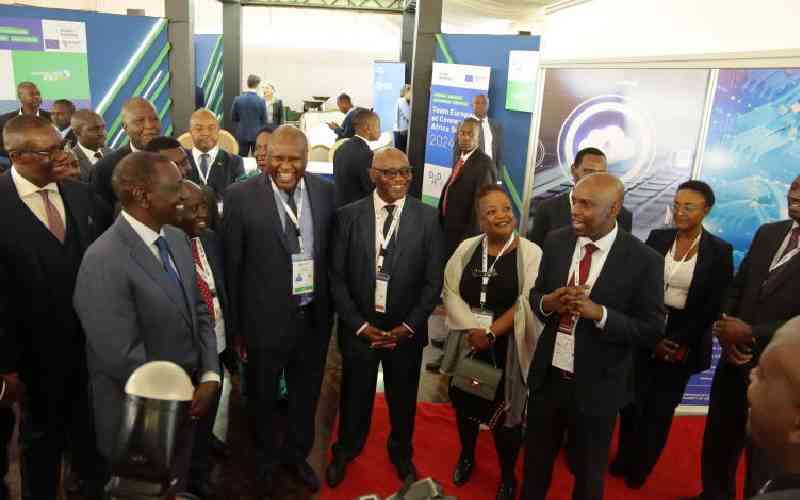 |
|
Youth contractors in Uasin Gishu County were among the lucky to win conntract to construct the Eldoret-Kapsoya Road last year. However, many youth and women have shied away from this initiative. [PHOTOS: KEVIN TUNOI/STANDARD] |
When the Jubilee administration launched a programme setting aside 30 per cent of public contracts to be given to the youth, women and persons with disability, it was expected that the uptake would be extraordinary.
The move was expected to address the giant problem of youth unemployment and foster an entrepreneurial culture across the three groups.
Enterprises run by these groups would have earned a massive Sh200 billion annually through this preferential treatment. But the number of companies that have expressed interest is dismal and those that have successful been awarded contracts appallingly small.
Two years after the launch of the initiative, referred to as Access to Government Procurement Opportunities (AGPO), only 60,000 firms have been registered. This out of hundreds of thousands of enterprises registered by the youth, women and persons with disabilities. Of this, a paltry 3,000 entities have successfully applied for and been awarded tender under the programme. This represents about five per cent.
According to a Devolution and Planning Ministry document seen by The Standard on Sunday, this gap remains a challenge to be addressed in ensuring the target groups take full advantage of the Sh200 billion opportunity. “Since rolling out of the programme, it has been noted that uptake has been low in terms of entities registering for AGPO,” read the ministry’s document in part. The ministry is concerned by low uptake and to an extent the obliviousness among enterprises that should be benefiting from this. The ministry is now planning to undertake a major marketing and communication campaign to try and deepen awareness of the preferential treatment given to enterprises by these groups and hopefully increase uptake of government contracts set aside for them.
The ministry is recruiting a communications agency to undertake a major marketing drive across the country, engaging companies run by youth, women and disabled persons. Other than awareness creation, the consultant is expected to set up an ICT based monitoring system that will track enterprises run by these groups and whether they are bidding for government jobs.
“The overall objective of the assignment is to develop a campaign targeted at youth, women and persons with disabilities that will effectively communicate the opportunity that exists under the AGPO programme,” the document reads.
Grass cutting
The shortlisted agencies are expected to submit proposals on how they will undertake the exercise in the course of this week. The ministry will then pick the winning bid in the coming weeks.
During its launch, President Uhuru Kenyatta stated that the 30 per cent allocation of all government procurement to the youth rule should be adhered to, warning those who will fail to effect the directive will be sacked. The initiative followed retired President Mwai Kibaki’s move in February 2012 that directed that 10 per cent of all government contracts “be earmarked and awarded to the youth”. The policy directive was informed by the government’s realisation that to meaningfully address youth unemployment, it is imperative to give them opportunities to participate in public contracts and tenders.
AGPO’s core goal, according to its architects, was to facilitate the youth, women and persons with disability-owned enterprises to participate in government procurement, thus giving them more opportunities to do business with government. The development may be frustrating to the government that promised to create one million new jobs every year to revive Kenya’s economic growth.
Yet, critics blame the government for the slim uptake, arguing that the country’s procurement procedures are still bureaucratic and lack the desired transparency. Importantly, they say, some of the contracts are “abnormally” capital intensive, thus locking out would-be beneficiaries who are financially lightweights.
Because of the limitations, enterprises that qualify to undertake the government jobs can only get the very basic contracts. This is a view that is entrenched within the government, with all the procuring entities setting aside what is known within the procuring entities as ‘grass cutting’ jobs for the youth, women and persons with disabilities.
Thus contracts set aside for these groups will include delivery of flowers, newspapers, office stationery, cleaning services and maintenance of grounds. The latter involves maintenance of gardens and hence the name grass cutting.
 The Standard Group Plc is a multi-media organization with investments in media
platforms spanning newspaper print operations, television, radio broadcasting,
digital and online services. The Standard Group is recognized as a leading
multi-media house in Kenya with a key influence in matters of national and
international interest.
The Standard Group Plc is a multi-media organization with investments in media
platforms spanning newspaper print operations, television, radio broadcasting,
digital and online services. The Standard Group is recognized as a leading
multi-media house in Kenya with a key influence in matters of national and
international interest.
 The Standard Group Plc is a multi-media organization with investments in media
platforms spanning newspaper print operations, television, radio broadcasting,
digital and online services. The Standard Group is recognized as a leading
multi-media house in Kenya with a key influence in matters of national and
international interest.
The Standard Group Plc is a multi-media organization with investments in media
platforms spanning newspaper print operations, television, radio broadcasting,
digital and online services. The Standard Group is recognized as a leading
multi-media house in Kenya with a key influence in matters of national and
international interest.










